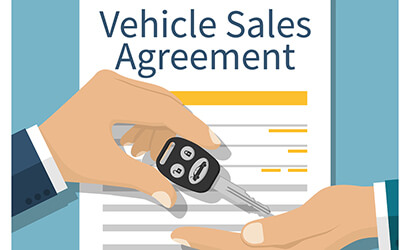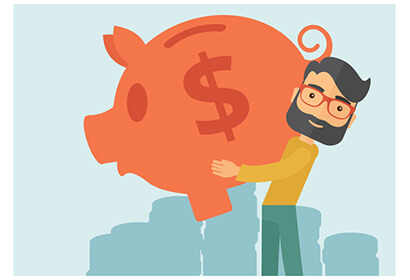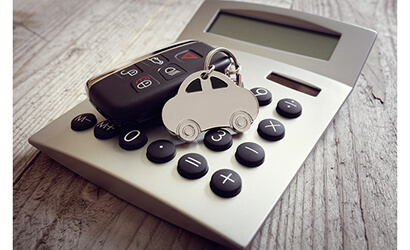
Is Leasing a Car Right for You?
Leasing a car can have many benefits for a person, but deciding whether or not leasing is going to be beneficial for you personally is an important thing to do. It is likely that you have heard some myths about leasing a car that make you think that perhaps leasing is not for you. More often than not, these myths stem from people who have never leased a car and are just repeating what they’ve heard. Sometimes, they come from people who have leased cars and had a bad experience. These people often insist that leasing is not for you, either, but that choice should only be left up to you.
Many people are satisfied with leasing a car. Leasing a car allows you to drive a brand new car every few years at the fraction of the cost of buying. While, just like any other contract, sometimes things might not go smoothly, it does not mean that is always going to be the case; there are so many benefits that outweigh a potential negative experience that it is worth finding out for yourself if leasing is good for you. Leasing will, unlike buying a new car, let you pay for only what you use of the car. It helps you avoid paying ridiculous prices for repairs and maintenance as well. By leasing, you can save money on the same car that you would buy outright with cash!

It is important to know that leasing a car is not a gimmick, despite what these untrue myths might say. Leasing is a truly feasible option for those who are aware of their budgets and want to get the best experience and the most money out of their car as possible. If you are one who likes the idea of driving a brand new car every few years, one that comes with a warranty and no costs on repairs and maintenance, leasing is definitely for you.
If you are still uncertain, check out the pros and cons of leasing and buying below to decide for yourself which is right for you.
Weighing the Pros and Cons of Leasing or Buying
When people go into a dealership looking to lease a car, they often are not sure what to expect. Oftentimes, car-leasing agencies will capitalize on your ignorance, as there are a lot of things to take into account while leasing a car. This can often be confusing for those unfamiliar with the process, so it’s important to know what to expect.
The first question out of their mouths will often be "how much of a monthly payment can you afford?" This is often a trick question, as whatever you answer will often be what they set as your payment, even if it’s way too much for the car you’re getting. It’s important to negotiate the price of the car while you’re in this office, just like you would when buying a car. Find out what a good price is online before even going into the dealership. You’ll also want to listen to what the dealer thinks the residual will be when you return the car, which just means how much it will be worth when you return the car; assuming that you don’t want to buy it at the end because this will affect your monthly rate as well. In addition, you can’t forget hidden interest rates.
This may sound like a daunting endeavor with so many things to take into consideration, and it leaves many people afraid to lease a car because of it. If this sounds like you, continue reading this article to get a good idea about common fears regarding leasing a car and some knowledge that will help to alleviate these fears and allow you to get a good deal on your car.

Common Car Leasing Myths
Many of the myths detailed below have been constructed by those who have never leased a car and are only parroting the myths that they have heard. Just as many of them are perpetuated by people who have had one bad car leasing experience and now assume that all car leasing deals are just as bad. Read the few myths and truths below to help ease your mind about car leasing.
Car Leasing is the Same as Car Fleecing
When it comes down to it, the truth about leasing a car is quite simple: it is a financing route much like purchasing a car is one. There is always the possibility that you can indeed get fleeced, but this can happen regardless of if you choose to buy or to sell. In all honesty, the likelihood of getting fleeced is a bit greater when you are purchasing a used car because of not only the potential lack of a warranty, but because of the uncertainty that comes with the condition of the car. When you are leasing a new car every three or four years that comes with a warranty, you can be sure that you are not going to be responsible for paying those expensive repair fees. Leasing can be fleecing, but only when you are making a bad deal. In the same vein, you have to watch out for this when you are buying a car as well–most notably, a used one.
My Personal Accountant Told Me Car Leasing is Negative
It is important to consider that while an accountant does have a job that makes them good at counting money, it does not inherently mean that they know anything about financial planning or financial advice. There are a few things that an accountant does need to know about leasing a car, though: one thing is that it does indeed offer a few tax benefits for those in business. Another thing is that a car is by far the most depreciating asset that you will ever purchase. An average car will lose 50 percent of its value in three years and a whopping 60 percent of its value in only five years. This means that the $30,000 dollar car that you purchased will only be worth $12,000 after five years have passed. This is usually the amount of time that it will take for you to pay off the loan, anyway.
Automotive Leasing is More Expensive in the Long Run
This myth can only be considered to be true if you are comparing buying a car to leasing, doing your own maintenance and repairs and holding onto the vehicle for more than five years. It is even arguable that you pay cash up front for your new vehicle, you can save money after five to seven years. In reality, who has time for that? Paying a high sum for a new car is a mistake. Even if you were in the possession of such cash, the logic that rests behind it is unstable. Won’t the sum of money that you put into the car have to be recouped? Interest on a loan has its reasons; borrowing costs work both ways.
Also consider that when you lease a car once every two to four years, you are not only paying a lower monthly bill, you are only paying for the part of the car that you are using. Whatever money that you had in the bank going into the car dealership will still be there, and it will be accruing interest. Additionally, if you have leased your car for at least 36 months, it is unlikely that you will need to pay for alignments, brakes, tires or other repairs like leaks.
Do the Math for Yourself

Before negotiating a price, it is important that you go in armed with information. The car lease ratings number is important to consider. This is often going to be the Lease Value Ratio. The Lease Value Ratio is just a number that puts in plain terms how much of the car you are actually getting for your money. While you can consider other items in a lease agreement like capital cost, residual value, depreciation and MSRP, it is arguable that these factors are not as important as the Lease Value Ratio. When it comes down to it, the bottom line about a lease is the cash flow and the amount of "car" you are getting for how much you pay for it.
Lease Value Ratio is simply the average payment you make monthly divided by the manufacturer suggested retail price of a vehicle or the MSRP. The monthly payment will include any costs that were paid to negotiate the lease or any down payments that were implemented. It is important to remember that car leases should not require any sort of a down payment. The down payment is just a way that can help you to reduce your fixed monthly payments. All in all, you will still have to make that monthly payment regardless of it being up front or month to month, so it does need to be accounted for in terms of total cost. Use the Lease Value Ratio to determine this.
The lower that the Lease Value Ratio is, the better deal you are getting with your car lease. Now that you understand how to calculate this number, what number, or percentage, should you hope to reach? The results of this calculation will typically fall between 1 and 1.5 percent. A good car lease will be below 1.11 percent, while a bad one would be considered 1.36 percent and above.
Look below for a more detailed idea of good and bad leases:
- 1.10 percent and Below – Excellent Lease
- 1.11 percent – 1.20 percent – Good Lease
- 1.21 percent – 1.36 percent – Average Lease
- 1.36 percent and Up – Poor Lease
What Makes People Afraid of Leasing a Car?

Leasing sounds like a good thing to do when you first explore your options for getting a new car. You go in, pick out your car, negotiate a low payment and interest rate based upon a number of factors, and you drive away with a new car, maybe even one that you’ve always wanted. In a couple of years when your lease has expired, you’ll bring the car back and trade it in for another new car. Sounds great, right?
While leasing is a viable option for many people, just as many people feel nervous about doing so. One thing to take into consideration when it comes to leasing a car is the fact that you are always going to have a car payment. The payment will likely be much lower than the amount you would pay when buying a car, but unlike buying a car where you will eventually pay it off completely, you are going to be caught in a perpetual cycle: getting a new car, paying the bill every month, bringing the car back to the lot in a few years, getting a new car, paying the bill every month–you see where this is going.
People are also wary of dealers who are not totally transparent and honest with their potential customers. Some dealers will withhold information such as how much the car could be purchased for at the end of the lease. Customers may also not know how many miles are on the car or what the mileage limit is and may end up having to pay money per mile to continue driving it. The best advice is to just be sure that you are well informed about what a lease entails and are not afraid to ask questions.
Dealers also may charge customers money if there is excessive wear and tear on the car than the lease allows, which is reasonable when it comes to everyday driving. Credit history is another deciding factor in getting a car leased. Consumers need to have a mid to high credit score in order to get a lease from a reputable dealer. Oftentimes, if your credit score falls beneath the 600 point range or so, you are going to have a hard time finding a dealer who is willing to lease you a car. For these reasons, to help you feel more confident about leasing a car, it is important that you are arming yourself with the necessary knowledge both off the lot at home and on the lot while discussing the terms of your lease.
What Is the Difference Between a Car Lease and Car Financing?
When it comes to leasing a car and financing one, there are a few similarities: you go to the car lot, pick out a car, agree upon a monthly payment, and leave with the keys in hand. While they are similar, there are fine details that will separate the two. Which one is best for you often depends on your unique needs and financial situation. There are a few things to consider before deciding if leasing or financing will be better for you.

The Price
For most vehicles, you are going to pay less per month to lease a vehicle than you would to buy the same vehicle. Your lease payment will cover the depreciation of the car’s value, so that at the end of the lease when you bring the car back to the dealer, you will have paid the value that the dealer has lost over time. This means that most leases will also have restrictions on mileage, and if you drive more miles than the lease has allowed, you will have to pay more money at the end of the lease for depreciating the car further.
When you finance a car you are paying the depreciation of the vehicle alongside buying the car’s equity which will make your car payment higher. Still, there are not going to be any extra costs at the end of your financing period. Furthermore, when you are done financing your car, the payments will end. As stated before, with a lease, you will be forever paying monthly payments.
Affordability
One of the things that makes people want to lease a car the most is the ability to afford a nicer, more expensive car by leasing than you could purchase. The usually less expensive monthly payment on a lease may be much higher when you are financing, making leasing a better option. Another benefit that comes with leasing is that you can get a new car each time your lease is up, which usually means once every three years.
Ownership
The main difference separating financing and leasing a car is ownership. When you finance a car, the car is totally yours with no more payments. Each payment you make toward the financing plan helps build the equity in the car and brings you closer to owning an asset. With a lease, you have to return the car when the lease is up, making it more of a rental payment than anything. You can usually buy your car if you’d like at the end of your lease, but keep in mind that if you want to do that, you will be paying more money in the long run as opposed to financing the car instead.
Warranties
When leasing a car as opposed to financing it, the warranty will often be better. Most car manufacturers will offer great warranty protection for the first few years of the car’s life. This will often be the same length as your lease agreement. When you choose to finance a car, your maintenance costs will often be higher because the car will be yours after the warranty expires. Cars also become more expensive to maintain the older they get; with a lease, you will typically always be driving a new or newer car.
Should You Buy or Lease Your Car?
Let’s take a look at some stripped down pros and cons of both leasing and buying to help you make a more informed decision:
Leasing a Car:
- You will enjoy lower monthly payments, oftentimes with a low down payment or no down payment at all
- You can have the luxury of driving a better car for much less money
- You can get a new car every two or three years
- You will have lower maintenance and repair costs because the car will be under warranty
- You will pay less in sales tax than when financing
- You won’t have to worry about running into issues and hassles when you are trading in at the end of your lease
- You will not own the car when the lease expires, though you do have the option to buy it
- Your mileage is set by you from the start, meaning you might have to buy more miles if you go over
- It is harder to terminate a lease early should your needs end up shifting
- You could have to deal with excessive wear and tear fees, if you went over what is allowed
Buying a Car:
- You can make any changes to your car that you’d like
- You can drive it as often and as far as you’d like without fear of being hit with a mileage penalty
- You will save money in the long run on the car
- You will have more flexibility considering that you could sell the car at your discretion
- You can trade in the car on the next one that you purchase
- You will be paying a much higher down payment than with a lease so that you don’t owe more than the car is actually worth
- You are solely responsible for taking care of the maintenance and repair costs after the warranty has expired
- Your monthly auto payments will be higher than a lease payment
- You have to find a new buyer for your old car, resulting in becoming a salesperson
- You may have issues when trading in your car to get your next one, having to negotiate
- You will have more money invested in a car that is always depreciating
To conclude this list of pros and cons, leasing will make it easier to enjoy more car for less money since you are only paying for what you’re using over the course of a few years instead of paying for the entire vehicle. That said, buying will liberate you from a number of restrictions that come with leasing, including limits on mileage. Ultimately, you just need to decide which of these options is best for your unique situation.
Which Costs You More Money in the End?

While monthly payments will be lower when you lease a car as opposed to purchasing one, many experts say that on average leasing will end up costing you more money in the end. This is because when you purchase a vehicle, you are paying for the entire vehicle, including the depreciation value and the actual value on the car. And at the end of the finance loan term, you will be the owner of an asset, which is still continuously depreciating in value. Plus you are going to keep driving the same car for as long as you would like. Usually after 2-3 years, depending on the amount you drive, the vehicle will require more intensive maintenance and upkeep, such as new brakes, tires, wheel-alignment and so on. Furthermore, depending on the value of your used car, you are going to be able to trade it in, or sell it to get money toward purchasing a new car. Keep in mind selling a car is not always easy, it requires time and patience.
If you lease a car, you are going to have one of two options when the lease agreement is over: buy the car that you have been driving, which is a nice option to have. Or lease another car and begin a new lease agreement in your new car. By not having to waste time on finding a buyer for your old car, and becoming a salesperson yourself, you can enjoy that time on other things.
Things to Know about Financing a Vehicle
Understand the Big Picture
While getting a low rate on your new financing plan is truly a wonderful thing, you do need to keep in mind that this aspect of buying a new car is only one part of a massive whole. You need to be sure that you have a clear and complete understanding of the actual amount of money that you are going to be paying over the course of your finance plan when you are factoring into your decision the length of the contract, potential fees that you will have to pay, and the cost of insurance for that particular vehicle. There are resources online that can assist you in figuring this out.
You Don’t Have to Buy the First Car You See
Just like with any other purchase, especially one that is going to cost you a pretty penny either in the short term or the long term, it is important that you are doing everything you can to scope out all of your options and research your decision before you commit and sign any agreement. This means that, in terms of financing and buying a car, the best way that you can be sure that you are getting the absolute best possible rate when you are financing a vehicle is to shop around and do your homework. Your instinct might be to go with one lender or another, but you need to look around before you trust your gut. You can usually get financed through a dealership, yes, but you should also talk to other lenders such as credit unions, online banks, and local banks. You also need to remember to ask about incentives and rebates that come with working with certain lenders over another. Check your credit score as well, as this can have a big impact on the rate that you get quoted. All in all, just be prepared in every possible way so that there are no surprises and so that you are paying the lowest rate that you can.
Talk It Out

Once you know the sort of loans that different lenders can offer you and have figured out the best rate possible, you will want to try and negotiate that rate to be even lower than what is offered. Auto dealerships will often have more flexibility to offer than lenders from banks and credit unions. This means that you might get lucky and have a dealer who is willing to match the rate that is being offered by an outside source, or even go lower than what the other lenders have promised you in order to ensure that you are getting the best deal possible, and more importantly, getting it from the dealer themselves.
A Few Tips on Leasing a Car
Understand the following items in order to make the most out of your leasing experience.
Cap Reductions
With a cap reduction, also known as a down payment, you can reduce your monthly payments. While some may not like to do this up front, it can help make your month-to-month payments easier. You will need to examine your personal financial situation to determine if this is going to be a good idea for you.
Car Leasing Term
There are several different leasing terms. The most common ones are 24, 48 and 60 month leases, but there are also lease periods in between these increments. There are different strengths and weaknesses to each car lease, so consider which is going to be best for you. You can negotiate with the car lease term to try to get your lease down payment at a certain amount or to help make a decision regarding your lease term. It could benefit you, for instance, to lease your vehicle for a longer period of time if it can dramatically reduce your payment.
Security Deposits
A lot of leases, especially for a luxury vehicle, will need a security deposit. This will be a fee that you pay at the beginning of the lease which will often be the amount of a monthly payment. The fee is returned to you after the car has been returned. This is similar to a damage deposit you would put on a rented item. Security deposits can sometimes be negotiated, but some can’t. Regardless, you can use it to bargain with. Try and make demands up front to give you more leverage in negotiating.
Excess Wear and Tear and Disposition Fees
With leasing, typical wear and tear like dents and dings are okay, as is tire wearing. Anything over that can accrue a charge. It is important to consider that this might be something that you will have to deal with at the end of your lease.
Mileage
Finally, most leases only allow you to travel a certain number of miles per year. Many dealerships give mileages that hover between the 10,000 – 15,000 miles per year number. If you drive more than that, you will often have to pay .10 or .25 cents per mile. If you drive more than 15,000 miles every year, leasing might be something that you want to think about avoiding. If you typically drive under this, then leasing is certainly a good option to think about doing.
In the end, it will ultimately be your choice to finance or lease a vehicle. While there are many benefits to both options, there are just as many downfalls that you will want to take into serious consideration before making your choice. Whatever you do, ensure that you are armed with full knowledge of the process and the negotiating skills that you are going to need to make it work best for you.
